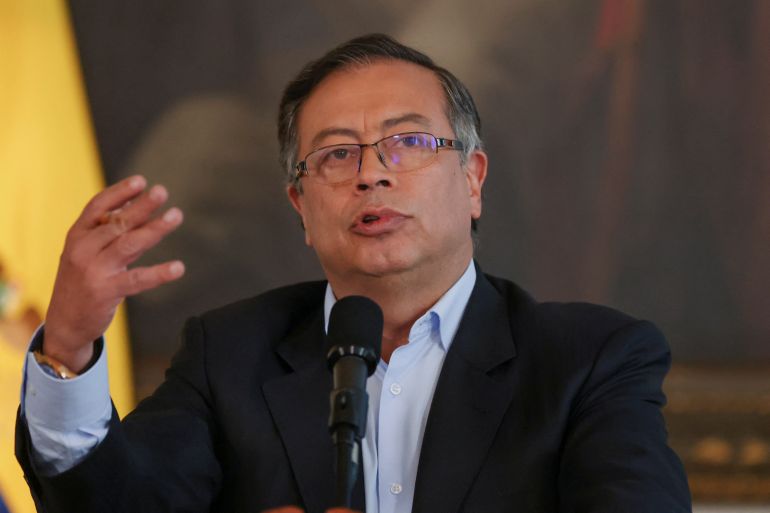Colombia agrees ceasefire with main armed groups: President
President Gustavo Petro announces ceasefire with the five largest armed groups to support peace talks.

Colombia’s government has agreed to a six-month ceasefire with the five largest armed groups operating in the country, President Gustavo Petro announced on New Year’s Eve.
Petro, the country’s first left-wing president, has pledged to end the Andean nation’s internal conflict, which has run for almost six decades killing at least 450,000 people between 1985 and 2018.
Keep reading
list of 3 itemsColombia and Venezuela to fully reopen shared border
Six Colombian soldiers killed in FARC dissident attack: Army
“This is a bold act,” Petro wrote on Twitter. “The bilateral ceasefire obliges the armed organisations and the state to respect it. There will be a national and international verification mechanism.”
Among the groups are the leftist armed group the National Liberation Army (ELN) as well as dissident groups run by former members of the now-demobilised Revolutionary Armed Forces of Colombia (FARC), Segunda Marquetalia and Estado Mayor Central.
The truce was the main objective of Petro’s “total peace” policy aimed at ending the country’s armed conflict, which has persisted despite the dissolution of FARC in 2017.
The armed groups still operating in Colombia, the world’s largest cocaine producer, are locked in deadly disputes over drug trafficking revenues and other illegal businesses, according to the Institute for Development and Peace Studies (Indepaz), an independent think-tank.
Despite the government’s efforts to negotiate with Colombia’s various armed groups, which include a combined total of more than 10,000 fighters, it has so far failed to contain the spiral of violence engulfing the country. Indepaz recorded nearly 100 massacres last year.
The ELN, the last recognised rebel group in the country, has been negotiating with the government since November.
The Segunda Marquetalia and Estado Mayor Central groups – splinter factions of FARC which broke from the 2016 peace pact – have held separate talks with the government.
AGC, the country’s largest drug gang, is made up of the remnants of extreme right-wing paramilitaries that demobilised in the early 2000s.
The government is offering the groups “benevolent treatment from the judicial point of view” for the armed actors “in exchange for a surrender of assets, a dismantling of these organisations and the possibility that they stop exercising these illicit economies”, Senator Ivan Cepeda recently told AFP news agency.
Some dissidents refused to lay down their arms alongside their FARC comrades six years ago, when the fearsome rebel group signed the deal with Bogota to end more than five decades of conflict.
Colombia has suffered more than 50 years of armed conflict between the state and various groups of left-wing fighters, right-wing paramilitaries and drug traffickers. There are currently about 90 political and criminal groups operating in the country, according to Indepaz.